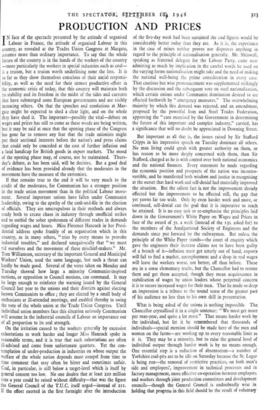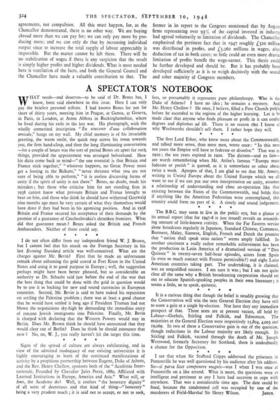PRODUCTION AND PRICES
IN face of the spectacle presented by the attitude of organised Labour in France, the attitude of organised Labour in this country, as revealed at the Trades Union Congress at Margate, assumes more than ordinary importance. To say that the whole future of the country is in the hands of the workers of the country —more particularly the workers in special industries such as coal— is a truism, but a truism worth underlining none the less. It is so far as they show themselves conscious of their social responsi- bility, as well as the need for their utmost productive .effort in the economic crisis of today, that this country will maintain both its stability and its freedom in the midst of the tides and currents that have submerged some European governments and are visibly menacing others. On that the speeches and resolutions at Mar- gate might be expected to shed a clear light, and on the whole they have shed it. The important—possibly the vital—debate on wages and prices has still to come as these words are being written, but it may be said at once that the opening phase of the Congress has gone far to remove any fear that the trade unionists might put their sectional interests before the nation's and press claims that could only be conceded at the cost of further inflation and a fatal handicap for British goods in export markets. The mood of the opening phase may, of course, not be maintained. Thurs- day's debate, as has been said, will be decisive. But a good deal of evidence has been provided already that the moderates in the movement have the measure of the extremists.
If that remains true to the end it will be very much to the credit of the moderates, for Communism has a stronger position in the trade union movement than in the political Labour move- ment. Several important unions have fallen under Communist leadership, owing to the apathy of the rank-and-file in the election of officials. They are unscrupulous in their methods and always ready both to create chaos in industry through unofficial strikes and to outbid the sober spokesmen of different trades in demands regarding wages and hours. Miss Florence Hancock in her Presi- dential address spoke frankly of an organisation which in this country, as in many others, " tries by every means to provoke industrial troubles," and declared unequivocally that " we must rid ourselves and the movement of these mischief-makers." Mr. Tom Williamson, secretary of the important General and Municipal Workers' Union, used the same language, but such a threat can hardly be made good. Several of the votes taken on Monday and Tuesday showed how large a minority Communist-inspired motions, or opposition to Council motions, can command. It may be large enough to reinforce the warning issued by the General Council last year to the unions and their districts against electing known Communists to office ; they are elected by a small body of enthusiasts at ill-attended meetings, and enabled thereby to swing the vote of the whole union at the Trade Union Congress. Until individual union members face this situation seriously Communism will assume in the industrial councils of Labour an importance out of all proportion to its real strength.
On the irritation caused to the workers generally by excessive exhortations to work harder and longer Miss Hancock spoke in reasonable terms, and it is true that such exhortations are often ill-advised and come from unfortunate quarters. Yet the con- templation of under-production in industries on whose output the welfare of the whole nation depends must compel from time to time comment that may often be bitter and sometimes unfair. Coal, in particular, is still below a target-level which is itself by general consent too low. No one doubts that at least 220 million tons a year could be raised without difficulty—that was the figure the General Council of the T.U.C. itself urged—instead of 211. If the effort exerted in the first fortnight after the introduction of the five-day week had been sustained the coal figures would be considerably better today than they are. As it is, the experience in the case of mines neither proves nor disproves anything in regard to the principle of nationalisation generally. Mr. Shinwell, speaking as fraternal delegate for the Labour Party, came near admitting as much by implication in the careful words he used on the varying forms nationalisation might take and the need of making the national well-being the prime consideration in every case. That cautious but wise pronouncement was supplemented strikingly by the discussion and the subsequent vote on steel nationalisation, which certain unions under Communist domination desired to see effected forthwith by " emergency measures." The overwhelming majority by which this demand was rejected, and an amendment, proposed by the powerful Iron and Steel Trades Federation, approving the " care exercised by the Government in determining the future of this important and complex industry," carried, has a significance that will no doubt be appreciated in Downing Street.
But important as all that is, the issues raised by Sir Stafford Cripps in his impressive speech on Tuesday dominate all others. No man living could speak with greater authority on them, or has reason to be more deeply concerned with them, than Sir Stafford, charged as he is with control over both national economics and the national finances. Every statement he made regarding the economic position and prospects of the nation was incontro- vertible, and he manifested both wisdom and justice in recognising at the outset that hard work and self-denial had materially improved the situation. But the salient fact is not the improvement already effected but the improvement to be effected still, the gap that yet yawns far too wide. Only by even harder work and more, or continued, self-denial can the goal that it is imperative to reach be attained. It is no easy task to re-emphasise the principles laid down in the Government's White Paper on Wages and Prices in face of the award of 5s. a week (instead of the 13s. asked for) to the members of the Amalgamated Society of Engineers and the demands since put forward by the railwaymen. But unless the principle of the White Paper stands—the court of enquiry which gave the engineers their increase claims not to have been guilty of a breach of it—inflation must get utterly out of hand, exports will fail to find a market, unemployment and a`drop in real wages will leave the workers worse, not better, off than before. These are in a sense elementary truths, but the Chancellor had to restate them and get them accepted, though they mean acquiescence in stabilisation of wages by union leaders whose perpetual concern it is to secure increased wages for their men. That he made so deep an impression is a tribute to the sound sense of the greater part of his audience no less than to his own skill in presentation.
What is being asked of the unions is nothing impossible. The Chancellor crystallised it in a single sentence: " We must get more per man-year, and quite a lot more." That means harder work by the individual, but let it be remembered that thousands of individuals—special mention should be made here of the men and women on the farms—are working up to every reasonable limit as it is. They may be a minority, but to raise the general level of individual output through harder work is by no means enough. One essential step is a reduction of absenteeism—a number of Yorkshire coal-pits are to be idle on Saturday because the St. Leger is being run—the removal of restrictive practices, on both men's side and employers', improvement in technical processes and in factory management, more effective co-operation between employers and workers through joint production committees and development councils—though the General Council is undoubtedly wise in holding that progress in this field should be the result of voluntary agreements, not compulsion. All this must happen, for, as the Chancellor demonstrated, there is no other way. We are buying abroad more than we can pay for; we can only pay more by pro- ducing more; and we can only do that by increasing individual output since to increase the total supply of labour appreciably is impossible. But the matter cannot be left there. There will be no stabilisation of wages if there is any suspicion that the result is simply higher profits and higher dividends. What is most needed here is ventilation of the facts, and both the General Council and the Chancellor have made a valuable contribution to that. The former in its report to the Congress mentioned that by August firms representing over 93% of the capital invested in industry had agreed voluntarily to limitation of dividends. The Chancellor emphasised the pertinent fact that in 1947 roughly £320 million was distributed in profits, and £3,260 millions in wages, after deduction of tax in .both cases; so little could an even more drastic limitation of profits benefit the wage-earner. This thesis could be further developed and should be. But it has probably been developed sufficiently as it is to weigh decisively with the sound and sober majority of Congress members.



































 Previous page
Previous page